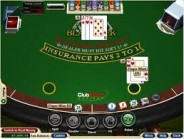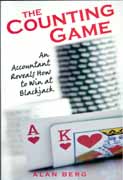
The Counting Game
Is Card Counting Legal?
 Basil Nestor is the author of the new Playboy Complete Guide to Casino Gambling. This wonderful book teaches players how to avoid sucker bets and win more when playing gambling games. He is also the author of The Smarter Bet Guide series for video poker, slots, craps, and many other books about gambling. Basil's website is www.smarterbet.com cards is absolutely legal, but it's an advanced strategy that can be tough for beginners to learn (unless you're Dustin Hoffman in Rain Man). So I'll explain how counting works, and then I'll tell you about an easier strategy for beginners.
Basil Nestor is the author of the new Playboy Complete Guide to Casino Gambling. This wonderful book teaches players how to avoid sucker bets and win more when playing gambling games. He is also the author of The Smarter Bet Guide series for video poker, slots, craps, and many other books about gambling. Basil's website is www.smarterbet.com cards is absolutely legal, but it's an advanced strategy that can be tough for beginners to learn (unless you're Dustin Hoffman in Rain Man). So I'll explain how counting works, and then I'll tell you about an easier strategy for beginners.Card counting is a system that tracks the ratio of tens to smaller cards (such as fours and fives) that are still in the deck. This ratio is important because tens make nice pat hands for players, and they often cause a dealer to bust when he hits. Conversely, small cards bust the dealer less, and they create more "stiff" combinations (like fourteen and fifteen) for players. There are various methods of counting cards, but all methods require you to observe every card that is dealt, and then you mentally add or subtract the card's value from a running count. You raise your bet if the deck has a lot of tens, and you bet less when small cards are plentiful. It's not as hard as it sounds, but counting isn't for everyone. The strategy requires you to be reasonably good with numbers.
Another thing to consider is that casinos don't want players to count cards. So even though counting is legal, it isn't welcome. Casino personnel are constantly looking for counters, and they will eject players who they suspect are counting. A lot of people still count cards, but they're careful about how they do it. One tactic is to avoid substantial increases and decreases in bet size. But of course, this reduces the effectiveness of counting.
In any case, counting is an advanced technique. You are new to blackjack, so you should be concentrating on basic strategy which is the most important tool for consistent winning. Basic strategy is easy to learn, and it nearly erases the casino's advantage. Think of it this way; basic strategy is the "cake," and counting cards is the "frosting" on top. Most of the "profit dollars" are in the cake. Go for that first. Counting cards can always come later.
Where can you find blackjack basic strategy? Right here at ReadyBetGo! Check out the ReadyBetGo Guide to Blackjack Basic Strategy and welcome to the world of blackjack!

